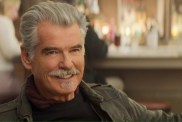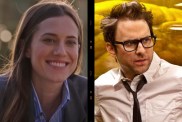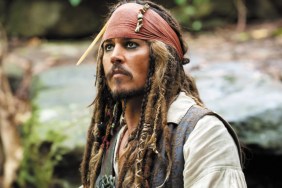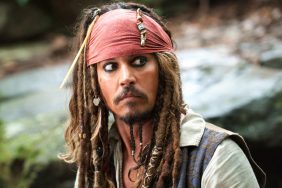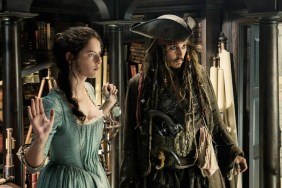Cast:
Johnny Depp as Captain Jack Sparrow
Geoffrey Rush as Captain Barbossa
Orlando Bloom as Will Turner
Keira Knightley as Elizabeth Swann
Tom Hollander as Lord Cutler Beckett
Bill Nighy as Davy Jones
Chow Yun-Fat as Captain Sao Feng
Naomie Harris as Tia Dalma
Jack Davenport as Captain Norrington
Keith Richards as Captain Teague
Jonathan Pryce as Governor Weatherby Swann
Lee Arenberg as Pintel
Mackenzie Crook as Ragetti
Kevin McNally as Gibbs
David Bailie as Cotton
Stellan Skarsgård as ‘Bootstrap’ Bill Turner
Martin Klebba as Marty
Review:
When last we left our double-crossing buccaneer brethren, Captain Jack Sparrow (Johnny Depp) had been cast into the briny depths of Davy Jones’ Locker — a sort of sailor’s Limbo — and it was up to eternally star-crossed lovers Will (Orlando Bloom) and Elizabeth (Keira Knightley) to rescue him, but to do that they’ll have to journey to the end of the world and back.
“Pirates of the Caribbean: At World’s End,” the third (and maybe final?) “Pirates” film, picks up shortly after the end of “Pirates of the Caribbean: Dead Man’s Chest” as the crew, joined by a freshly resurrected Barbossa (Geoffrey Rush), travel to Singapore to find a map that will lead them to the Locker and Jack.
After the action heavy “Dead Man’s Chest” the newest “Pirates” film travels at a fairly leisurely pace, or perhaps not so fair. It’s the longest of the three and often feels it. After a decent opening sequence “At World’s End” tends to bog down into constant exposition trying to set up a climax and payoff that seems to take forever to arrive and isn’t quite strong enough to make up for how long we have to wait to get to it. There’s enjoyment to be had before then of course — one of “Pirates” strong suits has always been it’s meandering, ever-shifting loyalties and the way that affects the plot and its characters — but they’re much farther apart than in the previous two installments. Not surprisingly they’re usually the moments when Johnny Depp is front and center, and when he’s not, well Pacing has always been a problem for the films and the newest one struggles the most with it.
Director Gore Verbinski and returning screenwriters Ted Elliot and Terry Rossio continue doggedly to try and give everyone their due and while that would normally be something to be admired, in “Pirates” it actively takes away from what makes the film work. Whether it was intended or not, Depp is the star of the show and his Captain Sparrow is still the most interesting thing in the film, particularly as he becomes even more mad (if such a thing were possible) following his stay in the Locker and often has extended conversations with several versions of himself.
Compared to that, everyone else is pretty standard. The villains Cutler Beckett (Tom Hollander) and Davy Jones (Bill Nighy) so well introduced in “Dead Man’s Chest” are left adrift here, given almost no growth and generally serving as plot devices and not getting a chance to do much else. The same is true for Jonathan Price’s Governor Swann and Jack Davenport’s Admiral Norrington, who’s presence is sorely missed. They’re in the movie, to be sure, but despite their stories being wrapped up along with everyone else’s they come across as not much more than dead weight. The only reason they’re still around is because they happened to be in the first. It’s a real loss, particularly Davenport, who added quite a bit to the “Dead Man’s Chest.”
And they’re dropped to make room for the returning Barbossa and the new pirate captain Sao Feng (Chow Yun Fat), and it doesn’t seem to be a particularly fair exchange. Rush is as good as ever, but he doesn’t give the film the same oomph as a supporting player that he did as a villain. Chow Yun-Fat is Chow Yun-Fat and despite a few tries, he is also left behind by the necessities of the plot. For as little as he’s actually given to do — besides strut and add atmosphere — they may as well have continued to develop one of their existing characters.
Bloom and Knightley are the same as ever, trying to make their way through the madness so that they can finally get married and settle down — which seems like a strange goal for the headstrong and willful Elizabeth Swann, but who knows. Bloom is still extremely wooden, except when he’s trying to be Jack, and for all the good scenes they have, they also tend to get stuck with some of the most ridiculous things in the script. Unfortunately, unlike Depp they’re forced to play it straight. In particular, an extended fight scene during the finale — which I think was supposed to be romantic and funny — is excruciating to watch.
Verbinski can be a subtle director, but in “At World’s End” he is about as heavy handed as can be, from the drawn-out opening to the equally drawn out conclusion. He seems to be going for some kind of grand operatic feel, mixing stirring spectacle with strong emotion, but for the most part he overplays his hand so badly that the emotion gets lost in the shuffle and what we’re left with is empty spectacle, which isn’t quite as good as the spectacle of the previous film. The concluding battle between the Pirate and East India fleets in particular comes out as horribly ill-staged, with a great deal of setup seemingly wasted.
It’s too bad. Sparrow is still as strong a character as ever and there’s some interesting stuff that you normally don’t get in a big summer adventure film. Normal good/bad morality is casually tossed out the window as everyone and their brother does whatever it takes to get what they want, and it’s a rare film that can pull that off and still leave you rooting for the ‘good’ guy. Rossio and Elliot have included some interesting thematic work as well, regarding the dangerous of globalization and the potential harm it can cause to individual human freedom, as well as the subjugation of traditional matriarchal rule to a patriarchal society and what society at large may have lost as a result of that. Like most of the film, all of that tends to get lost in the shuffle, but it’s there none the less.
“Pirates of the Caribbean: At World’s End” isn’t a bad film, Depp is as good in the role as ever, but it’s nowhere near as good as it could have been. If nothing else, it’s ambition and moral ambiguity still set it apart from the pack, but as a send off to the trilogy it staggers across the finish line more than winning out right.


